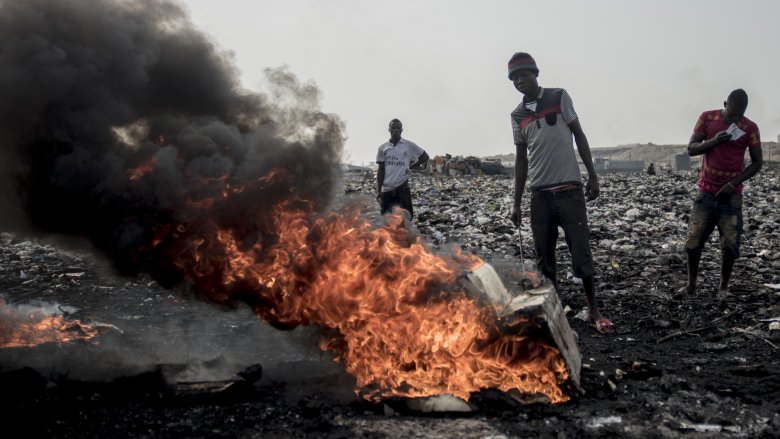The Most Toxic Place On Earth Isn't Chernobyl
Chernobyl is to toxic disasters what Kleenex is to tissues. If you grew up before Y2K, it's likely synonymous with your idea of what happens when science goes wrong. Yet while Chernobyl is quite the recognizable "name brand" of environmental disaster locations, there are plenty of other places taking up sizable market share. These Puffs, Scotties, and Nice & Softs of natural desolation hold their own in terms of sickness and despair, and believe it or not, there is actually a place more toxic and horrifying.
The Blacksmith Institute, a pollution-centered non-profit, ranked Agbogbloshie Dumpsite in Accra, Ghana as the most toxic, polluted place in the world, with Chernobyl coming in second. What makes it so bad? According to the report, Agbogbloshie is the second-largest e-waste processing center in West Africa. E-waste, or electronic waste, is a catch-all term to describe the things people don't know what to do with when they break, like microwaves, TVs, fridges, and computers. All those items take a lot of effort to break them down and recycle the individual components accordingly.
While it might not sound that bad at first, the size of the facility and what is done during recycling account for its high placement. The report states that "Ghana annually imports around 215,000 tons of secondhand consumer electronics from abroad, primarily from Western Europe, and generates another 129,000 tons of e-waste every year."
The primary health concern arises from the burning of sheathed cables to get to the salvageable copper inside. Styrofoam is often used as fuel for the cable fires, which contain a range of toxic heavy metals like lead, which then make their way into just about everything –- the air, the soil, the water, and the lives of at least 50,000 impoverished Ghanaians living in the immediate vicinity.
While the EPA considers 400 ppm the standard for lead in soil, samples from Agbogbloshie contained over 18,000 ppm, roughly 45 times what is considered toxic. Other samples found toxic levels of aluminum, copper, and iron.
To make matters worse, the United Nations' Food and Agricultural Organization reports that one-third of Accra's street food vendors buy their food from a market in Agbogbloshie, meaning the city's population of 2.5 million is eating extremely contaminated fare. So, while Chernobyl is still terrible, Agbogbloshie may end up affecting even more lives.
